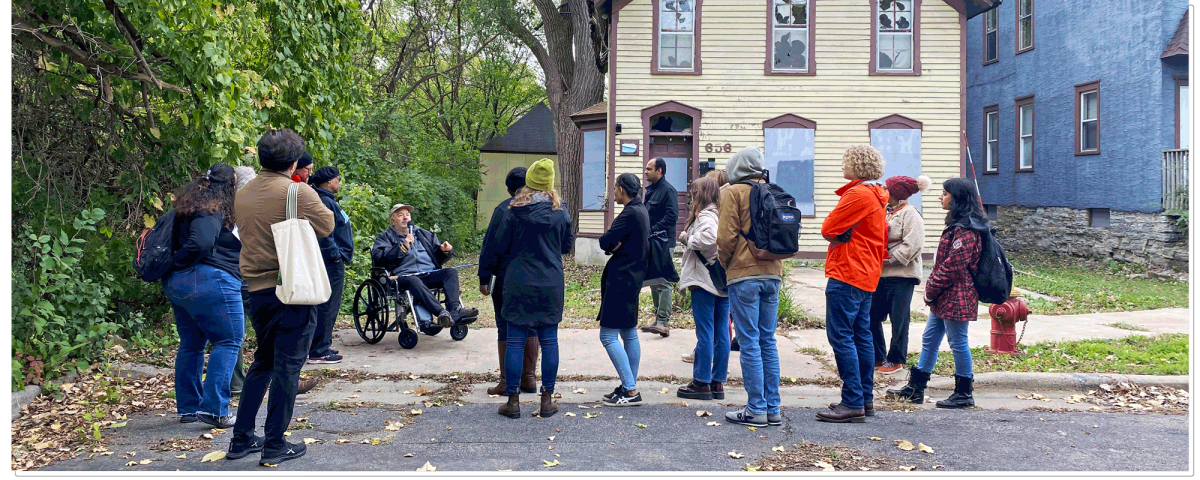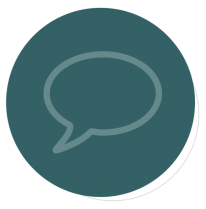Global Health in Local Contexts

Global Health in Local Contexts: A Transnational Experiential Course on the Social Determinants, Health Equity, and Leading Change immerses students in a relational, place-based study of the global social forces that impact health. The course centers storytelling to explore community-based healthcare and the practice and possibilities of global health in local settings.
This course uses an inter-professional and experiential model. The course is "classroom-less" and entirely held in community settings, such as Frogtown Farm, the UMN Community-University Health Care Clinic, and Bdote/Fort Snelling State Park.
Students will also engage in collaborative learning with peers in Uganda and Haiti who will be engaged in parallel, geographically-based courses. Read an article published about the course model: Rethinking global health from south and north: A social medicine approach to global health education
Course Highlights
The course provides an opportunity to dive deeply into local health disparities and to become part of the solution. Students will explore what creating conditions for healing, health, and safety means in their own lived communities through exposure to community organizing, mutual aid and community-based care, embodied healing practices, the arts, and storytelling.
- Theoretical and experiential engagement with racial capitalism, embodiment, abolition, storytelling, narrative health, and Theater of the Oppressed
- A visit to the sacred space of Bdote led by storyteller Jim Bear Jacobs
- Connection with the land and story of Frogtown Farm
- A pilgrimage to George Floyd Global Memorial with Jeanelle Austin
- A walking tour on Payne Avenue led by Peter Rachleff of East Side Freedom Library exploring immigration and labor movements
- Sharing creative performative space with zAmya Theater Troupe
- Contemplation of global solidarity and transnational partnership with peers from EqualHealth
- Opportunities to reflect upon and craft one's personal story of commitment to health justice and work

"The multi-disciplinary nature of the course forced me to think outside of my own boundaries... It made me more committed to building health equity in every aspect of what I do. This was the best class I have taken ever."
– School of Public Health student
Global Health in a Local Context Instructors
- Lead Instructor: Michael Westerhaus - Assistant Professor, University of Minnesota Medical School; HealthPartners Center for International Health; Leadership Committe of EqualHealth
- Co-Instructors:
- Jennifer Hines - Medical Director, HealthPartners Midway and Center for International Health Clinics
- Aarti Bhatt - Assistant Professor, University of Minnesota Medical School Division of General Internal Medicine
Discover How to Apply
Applications for this course open each year in April. All students must first apply online, and will be given a permission number and further instructions to register for credit or non-credit enrollment.
Eligibility
Eligibility
- Open to all UMN graduate and professional students.
- The course is also open to members of the Twin Cities community with interest and experience in health-related careers.
- All participants must apply, and have instructor approval, before they will be able to register.
Credit & Requirements
Credit & Requirements
This program has both academic credit and non-credit registration options.
Academic Credit
Academic credit is available to graduate students for GHSR 6713 (3 credits).
It is up to the student to confer with their academic unit to determine if it meets their specific program requirements.
Students may be allowed to apply this program to other academic requirements per approval by their unit. Options may include:
- Public Health students: The course meets the requirement for the Graduate Minors in Health Equity and Global Public Health in the School of Public Health (you may need to inform your advisor that this course was previously PUBH 6713).
- Dentistry Students: DPD CE Opportunity. Contact Karin Quick at [email protected] for more information.
- Pharmacy Students: GHSR 6713 may qualify as pharmacy elective credit when enrolled in the course. Contact Peter Haeg at [email protected] for details.
Non-Credit
Participants who are not in need of academic credit can utilize this option. A Certificate of Completion will be issued for those that complete the requirements.
Medical Students: Medical School credit is not available for this program at this time. However 2nd, 3rd and 4th year Medical Students are welcome as non-credit students. Please discuss implications of fitting this extracurricular program and requirements into your schedule with your faculty advisors. Considerations by year:
- 2nd year - Students are still responsible for their required courses. Please be mindful of your semester course and exam schedule with this Thursday morning class schedule.
- 3rd & 4th year - Students are required to attend their scheduled rotations, so appropriateness depends on schedule. Fourth year students additionally need to consider travel schedule for residency interviews.
Requirements
All students are expected to miss no more than two class sessions and to complete the the following assignments:
- Bi-Weekly Journal
- Creating the Conditions for Health, Safety, and Well-being
- Transnational partnership discussions and activities
Additionally, students seeking credit must complete additional requirements including a final paper.
Program Fee
Program Fee
- For non-credit students, the program fee is $500.
- For academic credit students, regular tuition rates (3 credits) apply in lieu of program fee.
Dates and Location
Dates and Location
Dates: Thursday mornings (9 a.m. – 12 p.m.) and select Saturday mornings (9–11 a.m.), September 5 – December 7, 2024.
Location: The course is "classroom-less" and entirely held in community settings, such as Frogtown Farm, the UMN Community-University Health Care Clinic, Bdote/Fort Snelling State Park, and theatrical performance spaces throughout the Minneapolis/Saint Paul area. In addition, monthly Saturday morning sessions take place on Zoom with international partners in Uganda and Haiti who are taking parallel courses.
Schedule
- Weekly Meetings: Thursdays, 9:00 a.m. – 12:00 p.m. (in person)
- Monthly Saturday meetings: 9:00 – 11:00am (on Zoom)
- Saturday, Sept. 14
- Saturday, Oct. 12
- Saturday, Nov. 9
- Saturday, Dec. 7
- Immersion Day: Saturday, Sept. 21, 9 a.m. – 1 p.m. (in person)
Application
Application
Applications for the fall 2024 course are now open! Apply now
Each year, applications are open starting in April for the fall semester course. All students taking the course must first fill out an application. Following review, they will be given permission to register in OneStop.
Initial application review begins in June. If the course is not full by that time, additional applications will be reviewed and approved on a rolling basis.
Course enrollment is limited to 30 participants, with up to 15 spots reserved for community learners.
Application Process
- Fill out an online application
- Initial application review will begin in June, and then continue on a rolling basis.
- Once accepted, program staff will provide participants with instructions on how to complete the registration.
- If the course is full, applications will remain open until a sufficient wait list is obtained.
Scholarships
Scholarships
Scholarships are available for this course. To apply for a scholarship, complete the "Statement of need" section in your course application. Learn more about our scholarships here.